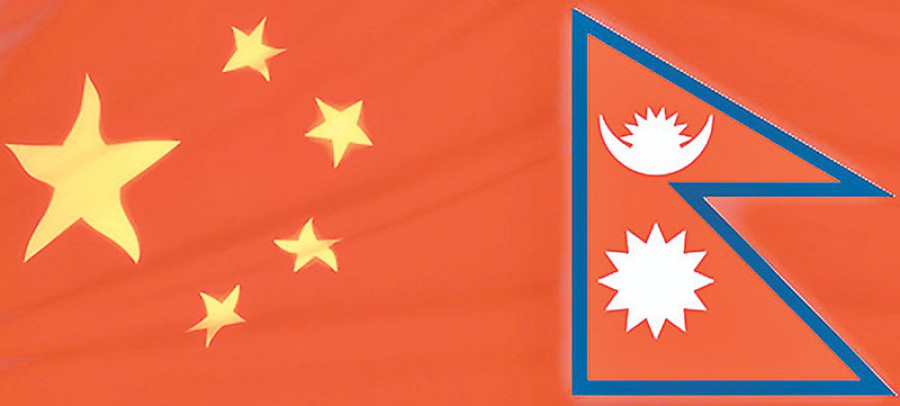Opinion
New political dynamics
The Sino-Nepal bonhomie will take bilateral ties to a new high
Gao Liang
'New era’ is a commonly used political lexicon in contemporary China. This was first proposed by President Xi Jinping in his report to the 19th National Congress of the Chinese Communist Party (CPC). Its purpose is to outline a series of new situations facing China’s national construction. The recent successful official visit of Prime Minister KP Sharma Oli to China has opened a new era in Sino-Nepal relations, as several important agreements towards enhancement of bilateral cooperation between the two countries were reached. The new era is also a national phenomenon rather than only international, as both Nepal and China are going through massive changes in domestic political dynamics.
China is an ancient civilisation with a 5,000-year long history. The Chinese understand the past in terms of different eras where each era has its own theme. So they tend to pay more attention to long-term goals. The year 2018 marks the 40th anniversary of China’s historic reform and opening up. It also marks the beginning of President Xi Jinping’s second term in office. He firmly believes that progress and reform are a continuous process. His grand objective is to realise the revival of the Chinese nation. Similarly, in Nepal, it is generally believed that a new political era has started and the country’s focus has also shifted to national construction. PM Oli came to power on the promise of bringing prosperity and stability to the country. What binds the destiny of Nepal and China together is the emergence of strong leadership.
Why Nepal?
In the backdrop of globalisation and regional integration, it is not at all an empty diplomatic rhetoric to describe the importance of Sino-Nepal relations as a major factor for the region’s peace, stability, and prosperity. An important geo-political position allows Nepal to play the role of a bridge between China and South Asia and, in some cases, as a safety valve that can easily affect the stability of the two vast regions it connects. During his visit to China, PM Oli repeatedly emphasised that the Nepali territory can never be used to harm neighboring countries, instead of merely committing this attitude specifically to China. Behind this seemingly tiny modification of expression lie the government’s neutral diplomatic principles.
China and Nepal established borders in peaceful and friendly way in the early 1960s. There are no major territorial disputes between the two countries. The situation on both sides of the border is stable and controllable, which is a great advantage for further cooperation between the two countries. The concept of an all-dimensional, interconnected and interoperable network consisting of railways, highways, energy lines and communications linkages across the Himalayas, would enhance Nepal’s ties with China and rest of Asia. Such ties open the probability of new passes and new trade routes, co-operation in hydro power and agricultural development, and exchanges in education and healthcare. Thus, people at both ends of the belt will benefit from it.
Why Tibet?
PM Oli made Lhasa, the capital city of Tibet Autonomous Region, China (TAR), the last stop of his trip to China. This, to some extent, shows Tibet’s special status in Sino-Nepalese relations. The Nepalese Consulate General in Lhasa is the only foreign resident agency in Tibet, and over 90 percentof China-Nepal trade is done through and by Tibet. As many analysts have pointed out, China’s interest is to safeguard the integrity and stability of Tibet. It is partly true. Crucially, the Chinese philosophy of governance has never been simply relying on strength to achieve ‘hard security’ but to pursue lasting stability of the whole western frontier by promoting co-ordinated development of economy and society. Taking into account the geographical location of the autonomous region and its close ties with Nepal, the opening up of the region to South Asia has become a top priority for China.
It is meaningless to over-interpret China’s political intentions of strengthening relations with Nepal. Diplomacy is nothing but a continuation of domesticpolicy. The ultimate goal of any foreign policy must be consistent with the country’s domestic affairs. In 2015, President Xi stated that good governance of the frontier is an indispensable part of governing the country. He also stressed that governing Tibet was part of the governing strategy of China. The fundamental goal of China’s neighbourhood policy thus remains unchanged—to create and maintain a favourable environment abroad. In the case of the Tibet Autonomous Region, a stable and prosperous Nepal means much more than a favourable environment for China.
New challenges
In the context of the new dimensions of co-operation between Nepal and China, there is no denying that there is a co-existence of challenges and opportunities. However, over-exaggeration of the risks is also not a proper attitude. When people are discussing the risk of the so-called Chinese debt trap, a cold war-style allegation, the only thing we need to fear is fear itself. When we talk about risks, we mean unpredictable factors that may harm our interests, not the intention of our partners. Tactical issues should not be raised to become a strategic one. Should we reject all cooperation only because of an imagined pitfall for self-preservation? A constructive solution is to reduce risks as much as possible through good communication and collaboration, not prediction.
What is being ignored, somehow, is that the risk in Sino-Nepal co-operation is shared by both partners. Plotting against Nepal does no good to China. In a highly diversified society like Nepal, it is absolutely normal to have a diversity of public opinion. There are varied opinions about the Belt & Road Initiative, and no opinion is wrong opinion. It is just that people are looking at issues from different angles. Truth does not fear contention. The more the truth is debated, the clearer it becomes.
Liang is doctoral student at the Sichuan University, China. His research is on China’s frontier politics and Sino-Nepal relations




 21.12°C Kathmandu
21.12°C Kathmandu










